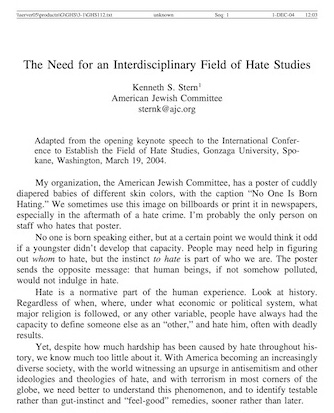Higher Education Working Group
Global academic directors from centers for hate studies and the Eradicate Hate Global Summit have formed the Higher Education Working Group. The Working Group will weave knowledge from the various academic fields together to provide usable theories and solutions about how hate works and what to do about it.
Members of the group — which is open to others who want to join the effort — will work to elevate the importance of Hate Studies teaching and research, to build additional centers in the academy to encourage new course initiatives, certificate programs, concentrations, minors, and majors identified as Hate Studies programs, and to facilitate the sharing of resources and best practices among those interested in building this emerging interdisciplinary field.
The Need
Kenneth Stern addresses The Need for an Interdisciplinary Field of Hate Studies in his publication for the Journal of Hate Studies.
Hate Studies Centers
Higher Education Working Group Videos
How American Philanthropy Fostered (and Perhaps Could Heal) Social Tension featuring Lila Corwin Berman, Professor of History at Temple University.
Hate and Conspiracy Theories featuring Joseph Uscinski, Professor of Political Science at the University of Miami.
Frequently Asked Questions
What is Hate Studies?
Hate Studies is an interdisciplinary approach to understanding the human capacity for hate, and what might be done to address it. Hate Studies is defined as “Inquiries into the human capacity to define, and then dehumanize or demonize, an ‘other,’ and the processes which inform and give expression to, or can curtail, control, or combat, that capacity.”
Why a Higher Education Working Group?
Since the founding of the Gonzaga Center for the Study of hate in the 1990s, Hate Studies Centers have opened in North America and Europe. Hate is an enormous topic, and each of these Centers looks largely at complementary, as opposed to duplicative, initiatives. The goal of the working group is to share information, support each other, increase the number and scope of academic programs focused on hate, and provide ways to use that new and increased knowledge for the betterment of society, including informing the work of civil society groups, government, the media, and everyone else.

